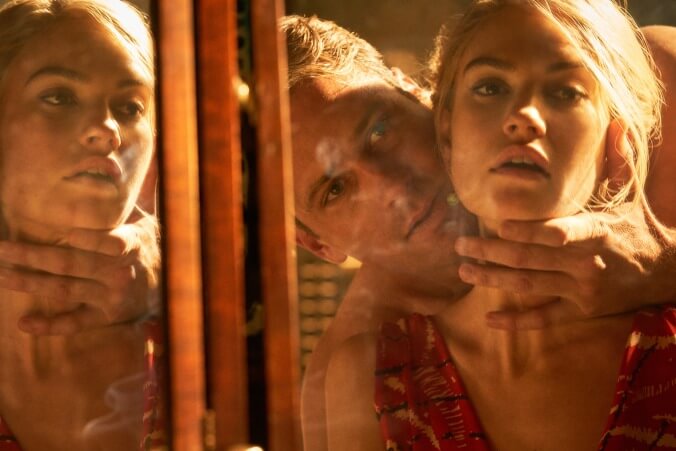Note: The writer of this review watched Rebecca from home on a digital screener. Before making the decision to see it—or any other film—in a movie theater, please consider the health risks involved. Here’s an interview on the matter with scientific experts.
The dreamlike qualities of Daphne du Maurier’s 1930s bestseller
Rebecca and its celebrated Alfred Hitchcock film adaptation are obvious even in a basic description of the premise. A nameless young woman meets an older, recently widowed aristocrat while working as a lady’s companion in Monte Carlo. After two weeks of romance, he marries her, and brings her to his estate, Manderley, where an entire wing has been preserved in the memory of his first wife, Rebecca. From the beginning, we know that Manderley is no more; it’s a ruin that is haunting the heroine as she starts to tell the story.
There’s an eventual twist (several, actually) that turns this perfectly distilled gothic fairy tale into a more conventional piece of early-20th-century suspense, with incriminating notes, doctors, and blackmail. But the arc remains one of lost innocence, beginning in romantic fantasy and ending deep into its era’s fondness for Freud. Hitchcock turned this into his first major work on the subject of morbid obsession (and the only one of his films to win an Oscar for Best Picture). Now, the English director Ben Wheatley has liberated it from those pesky ambiguities and turned it into an inane, leaden drama.
This Rebecca is billed as a new adaptation of the novel, but since the Hitchcock version is largely faithful to du Maurier, much of it plays like a scene-for-scene remake, with tweaks and additions to account for today’s apparently less adventurous tastes in old dark house stories. The first obvious change is that the unworldly and unnamed protagonist (Lily James) and the widowed Maxim de Winter (Armie Hammer) are now basically the same age (though Hammer is actually older than Laurence Olivier was when he played the role in the Hitchcock version).
Their courtship unfolds more or less as before. They meet at a hotel while she is traveling with her employer, the unbearable grand dame Mrs. Van Hopper (Ann Dowd). Lunch in the hotel restaurant soon turns to daily sightseeing trips in Maxim’s Bentley. Although his wife has been dead for less than a year, Maxim proposes, and after an offscreen honeymoon, brings his new bride to Manderley. There, she soon encounters the story’s famous villain, the manipulative head housekeeper, Mrs. Danvers (an icy Kristin Scott Thomas), who remains loyal to the previous mistress of the house.
Reminders of the beautiful and refined Rebecca seem to follow the second Mrs. de Winter (the only name ever given to the protagonist). In an effort to distinguish itself from previous versions—which include the Hitchcock film, two TV miniseries, and du Maurier’s own stage adaptation—this Rebecca has dressed its characters in the height of mid-1930s fashion; the formerly cobwebby untouched west wing of Manderley is now spotlessly clean and Art Deco. At one point, the heroine watches Maxim sleepwalk through its doors. The subtexts are now literal, which means that there aren’t any subtexts at all.
Nonetheless, the basic structure of the story is intact; some of its uncanniness even manages to survive Wheatley’s confused, unfocused direction. The filmmaker (who’s better known for the grotesque likes of Kill List, Free Fire, and A Field In England) can’t seem to decide whether he’s making an anonymous, corny prestige flick or simultaneously remaking both The Wicker Man and The Bitter Tears Of Petra Von Kant. While his archly stylized mirror staging of the main character’s interactions with Mrs. Danvers and random inclusion of songs by the jazzy late ’60s and early ’70s folk-rock band Pentangle occasionally puncture the decorum, the only truly surprising thing about Rebecca is how tame it is, even when compared to an adaptation that had to change a major plot point to abide by the Production Code.
The screenplay (by Jane Goldman, Anna Waterhouse, and Joe Shrapnel) goes to some lengths to neuter the psychosexual complexes of the characters, and given that these complexes are most of the story, the film inevitably descends into incoherence once the question of what really happened to Rebecca is stated out loud. While Scott Thomas, Dowd, and Sam Riley (as Rebecca’s shady cousin, Jack Favell) get fun one-note roles, James and Hammer are largely tasked with looking unhappy in handsome clothes. Anyone who manages to invest in these characters will be rewarded with an egregious happy ending that has been tacked on the fiery conclusion—which, like everything else, has been wrung through the de-ambiguifier. Manderley is in part a state of mind. In this Rebecca, that state is exasperating boredom.

